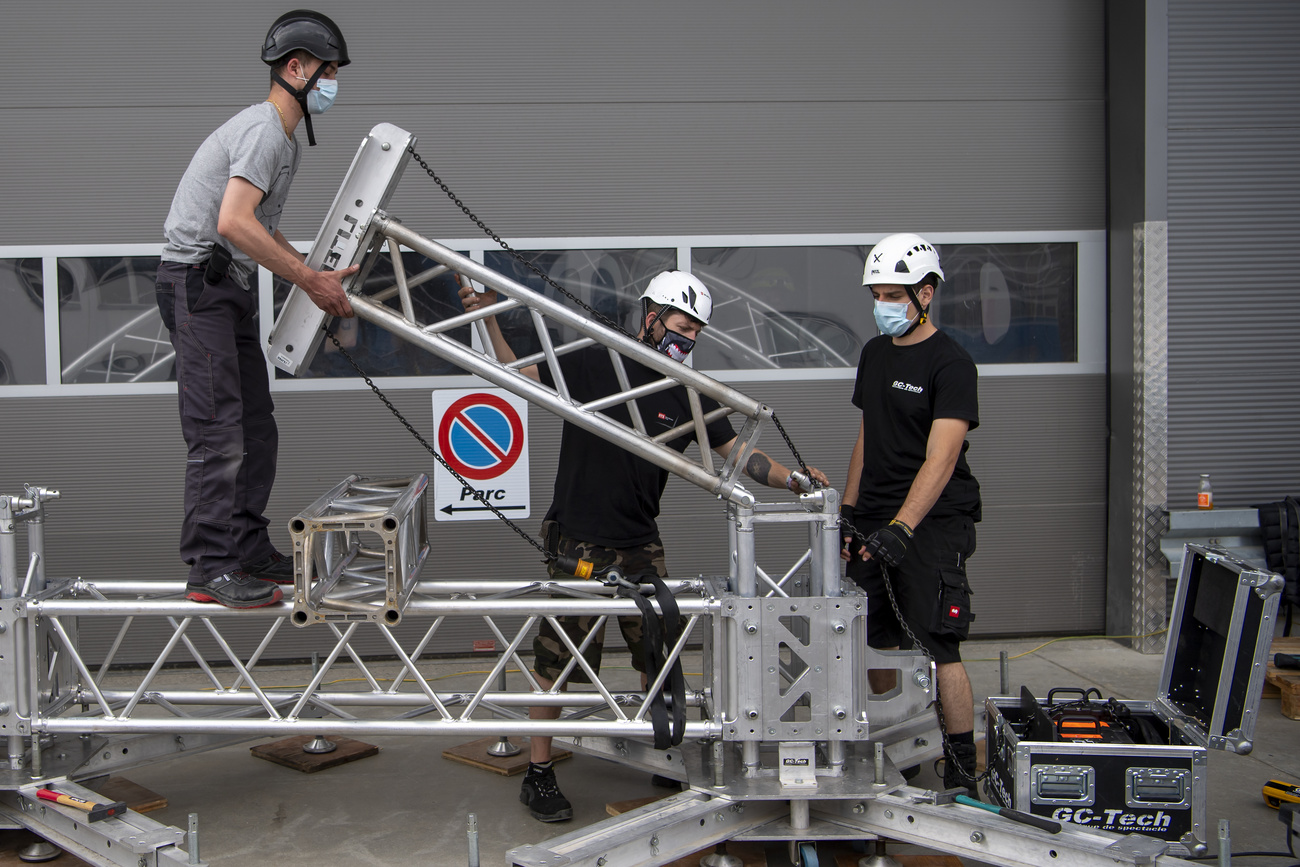Swiss apprenticeships bounce back after Covid-19 pandemic

Every August a new cohort of students begin their apprenticeships across Switzerland. The appetite for vocational training remains strong despite the impact of Covid-19, with experts pointing to a return to pre-pandemic levels. IT and computer science have filled the highest percentage of open positions in 2022.
Sinan Kaufmann, 15, had always been drawn to airplanes and helicopters. From early on, he became convinced an apprenticeship would be the most suitable path, allowing him to work as a craftsman in the aviation sector.

After visiting a job fair in Zurich in his first year of secondary school and several work placements, he landed a dream role: a four-year automation apprenticeship at the national carrier SWISS, specialising in aircraft maintenance.
Kaufmann is just one of the thousands of students who will be starting a training programme this August. Despite two years of the Covid-19 pandemic, demand for vocational education remains high in Switzerland – where it is the most popular route taken by school leavers.
The 2020 lockdown and subsequent work-from-home requirements pushed most training programmes to either cancel their course or go online. Meanwhile students struggled with e-learning not adapted for the hands-on approach offered by apprenticeships.

More
Are apprenticeships undergoing a ‘corona shock’?
At least 79% of apprenticeship roles have been filled for the year, according to the latest findings from the Apprenticeship Pulse research projectExternal link. The report by the chair of Education Systems at the Swiss federal technology institute ETH Zurich and apprenticeship jobs platform Yousty.ch tracks the impact and potential long-term consequences of Covid-19 on apprentices and training companies in Switzerland. While somewhat lower compared to 2020 levels of 87%, researchers nevertheless suggest a “normalisation” of the situation.
“What positively surprised us from the latest survey was that there seems to be a relatively quick recovery,” says Ursula Renold, professor of education systems at ETH Zurich and researcher for Apprenticeship Pulse. “The majority of companies think that it will be just as easy or even easier for young people entering the labour market to find a job after graduation than before the pandemic.”
Apprenticeships in Switzerland blend in-person learning at a vocational school with practical training at a company. The model is frequently touted as a success with benefits such as lower youth unemployment and reduced recruitment costs. It is estimated that around two-thirds of school leavers from the ages of 15 to 16 opt for this path after completing compulsory education.

More
Why the world should take note of the Swiss apprenticeship model
“It was always clear to me that I wanted to do an apprenticeship so that I could get a good start in the working world. I always wanted to earn my own money and be more independent at an early age,” says Vanessa Derendinger, 17, an incoming apprentice at Swiss Post.

Impact of Covid-19
Several apprentices told SWI swissinfo.ch that trial placements – a ‘taster day’ to get insights into the company and responsibilities – were scrapped during the pandemic. Others said there were hardly any offers in their chosen field during the health crisis. And for those who did manage to secure a training programme, the challenges of working from home soon became apparent.
“Apprentices typically spend three to four days per week at the firm. Most of their training is work-based and on-site,” explains Marco Salvi, senior fellow at the thinktank Avenir SuisseExternal link. “Taking it online was an even bigger challenge than for schools or universities. You cannot easily move a machine tool online. Working from home might be a boon for older workers – but not for apprentices.”
This was echoed by Renold who notes that home office had a “substantial impact” on learners. The Apprenticeship Pulse survey found a decrease in motivation levels and increase in stress. “It can be assumed that those apprentices who started their apprenticeship in 2020 have suffered the greatest loss of competence, as they were exposed to the effects of the pandemic for two years and their missed material has accumulated,” says Renold.
But Irene Kriesi, co-head of the research area Strategic Planning of VET from the Swiss Federal University for Vocational Education and Training (SFUVET), stresses that the overall impact of Covid-19 on Swiss vocational educational training was “mostly short-lived”. “The temporary decline in young people’s search behaviour [for apprenticeship positions] recovered quickly in many occupations to pre-pandemic levels,” she says.
Professions in demand
According to the State Secretariat for Education, Research and Innovation (SERI), more than 45,100 apprenticeship contracts have been signed so far this year. Students can choose from over 200 professions which eventually culminates in a federal apprenticeship diploma.
The Apprenticeship Pulse survey found that the fields of IT and computer science have been able to fill a high proportion of their available positions during the past two years.
Alissa Villiger, 15, is due to start her IT apprenticeship at TIE International, a Zug-based education company. Her work will involve learning programming languages to design websites and blockchain technology. “I liked this very much during the taster session and this profession also has a future,” says Villiger, who was hesitating between being a media technician and a commercial employee (the most popular apprenticeship among young people). The latter varies depending on the sector and can include tasks from organising meetings, managing expenses to advising customers
In contrast, hotel and restaurant occupations, including chefs, waiters and waitresses, still face a serious shortage of apprentices and skilled staff. “Although the pandemic is not the sole reason for this situation – unattractive working conditions, such as irregular and long hours also play a role – it has likely aggravated the situation,” says Kriesi.
Romi de Redelijkheid, 18, began her apprenticeship at the five-star Dolder Grand hotel in Zurich in 2021. She was attracted to the industry for its international working environment and the possibility to work abroad following training. “I was naturally apprehensive about starting my apprenticeship at such an uncertain time for the hospitality industry,” she says. “But I knew that if I didn’t take this step, I would regret it at some point.”
Outlook for apprenticeships
Overall, the hiring pace for Swiss training companies is bouncing back.
Swisscom plans to welcome 270 apprentices this August. That is 12 more hires than the summer of 2021. Meanwhile, Swiss International Air Lines (SWISS) is welcoming 41 apprentices on board this year. A company spokesperson noted that while there was a “slight decrease” in apprentices in 2021, this has since recovered to pre-pandemic levels.
To ensure its attractiveness going forward, companies such as Swiss Post are even promoting their apprenticeships on the social media platform TikTok. The national postal service hires 740 to 780 apprentices every year. Of these, more than 400 are in logistics, another 150 in retail and over 60 in the ICT department.
In addition, it is developing new job profiles in line with market needs such as digitalisation. As of 2023, Swiss Post will offer a new apprenticeship as a digital business developer together with PostFinance and other companies.
This is a trend, Avenir Suisse’s Salvi explains. “The content and curriculum can and will be adapted to the future needs of the economy. This is one of the main strengths of the dual education system as practised in Switzerland,” he says.
Ultimately, more efforts will be needed to keep the Swiss apprenticeship model relevant on the international stage. “The Swiss way is very successful, but it is not easy to replicate this success abroad. Indeed, there have been many failed attempts,” adds Salvi. “Unfortunately, the labour market is increasingly tilted towards formal educational credentials. Our system will always need a lot of explanation with respect to prospective international employers.”
Edited by Virginie Mangin

More
Switzerland seeks international recognition for those with vocational skills

In compliance with the JTI standards
More: SWI swissinfo.ch certified by the Journalism Trust Initiative













You can find an overview of ongoing debates with our journalists here . Please join us!
If you want to start a conversation about a topic raised in this article or want to report factual errors, email us at english@swissinfo.ch.